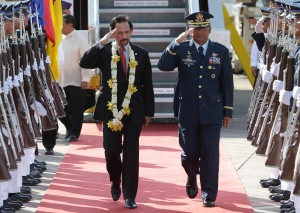China row on agenda of Bolkiah-Aquino talks

Brunei Sultan Hassanal Bolkiah, left, escorted by Filipino Lt. Gen. Lauro Catalino Dela Cruz, salutes during his arrival honors at Manila’s International Airport on Monday, April 15, 2013. Bolkiah is in the country for a two-day official visit. AP PHOTO/AARON FAVILA
MANILA, Philippines—The sultan of Brunei Haji Hassanal Bolkiah flew in Monday for a 24-hour state visit to the Philippines, ahead of next week’s 22nd summit of the Association of Southeast Asian Nations (Asean) in Brunei.
The sultan arrived at Ninoy Aquino International Airport Terminal 2 on a private flight around 3:40 p.m. He disembarked from the Royal Brunei airbus to a red-carpet welcome from Vice President Jejomar Binay, among other VIPs.
A copy of his itinerary released to the media by the Presidential Communication Operations Office showed that Bolkiah will begin his official activities at 10:20 a.m. Tuesday, with a wreath-laying at the Rizal monument at Rizal Park. Bolkiah will then motor to Malacañang to pay a courtesy call on President Aquino.
He is expected at Malacañang at 10:45 a.m.
The Palace said the two leaders will tackle Brunei’s chairmanship of the summit on April 24 and 25 in Bandar Seri Bagawan. The South China Sea conflict looms large on the agenda of their meeting.
Article continues after this advertisementThe President will then host a state luncheon for Bolkiah and his delegation in Malacañang’s Rizal Hall, where both will deliver remarks. Bolkiah is scheduled to fly out at 3 p.m.
Article continues after this advertisementIn the recent Asean Ministerial Meeting, Asean foreign ministers stressed the importance of a peaceful resolution to the standoff in the West Philippine Sea (South China Sea) by the claimant countries, including the Philippines, Brunei, Vietnam and Malaysia.
Asean member countries are looking to Brunei to mediate a common position on the conflict with the signing of a code of conduct to minimize the risk of conflict in the international waterway.
“Brunei is going to be the chairman, I think, of the Asean. So as to what the details will be, that’s something that will be taken up during the bilateral meeting,” said Secretary Edwin Lacierda, presidential spokesman, in a briefing.
Code of conduct
Lacierda could not say if the code of conduct would be tackled during the courtesy call, saying that as far as he knew, Asean member countries would draft this first, and then ask China to take a look at it.
“We’ll see first,” he said of the agreement by foreign ministers from Asean and China to hold a special meeting on the progress of the code of conduct.
In their recent meeting, Asean foreign ministers reiterated the importance of maintaining peace, stability, mutual trust and cooperation to enhance maritime security and the need for self-restraint in the South China Sea conflict.
They also vowed to work actively with China for the early completion of the code of conduct.
Foreign Secretary Albert del Rosario was quoted in reports as saying the Philippines would focus on “solidarity so that we can take a stronger position and we are pushing for the expedition of the code of conduct on the South China Sea.”
He said the Philippines was urging the “early conclusion of the code of conduct.”
Brunei has vowed to pursue a binding code of conduct among competing South China Sea claimants during its Asean chairmanship.
Apart from the four Asean member countries, Taiwan is also claiming parts of what the Philippines calls the West Philippine Sea.
Stressing importance
At the Asean summit in November last year, Aquino underlined the Philippines’ multilateral approach to the row and stressed the importance of adopting a code of conduct for the waterway.
At that summit, Aquino rebuked Cambodian Prime Minister Hun Sen for his statement that the regional bloc had agreed not to internationalize the issue.
Aquino said that five countries backed the Philippine position on the importance of a code of conduct with China. China maintained that the Asean was not the proper forum for this.
China claims sovereignty over nearly all of the sea, which is believed to sit atop vast amounts of oil and gas and is one of the region’s most important fishing grounds and to shipping lanes that are vital to global trade.
In the July 2012 Asean summit in Phnom Penh, Cambodia was accused of blocking efforts by the Philippines and Vietnam to take a more aggressive position against China. The meeting ended without a joint communiqué, a first in the regional bloc’s history.
Originally posted: 6:43 pm | Monday, April 15th, 2013